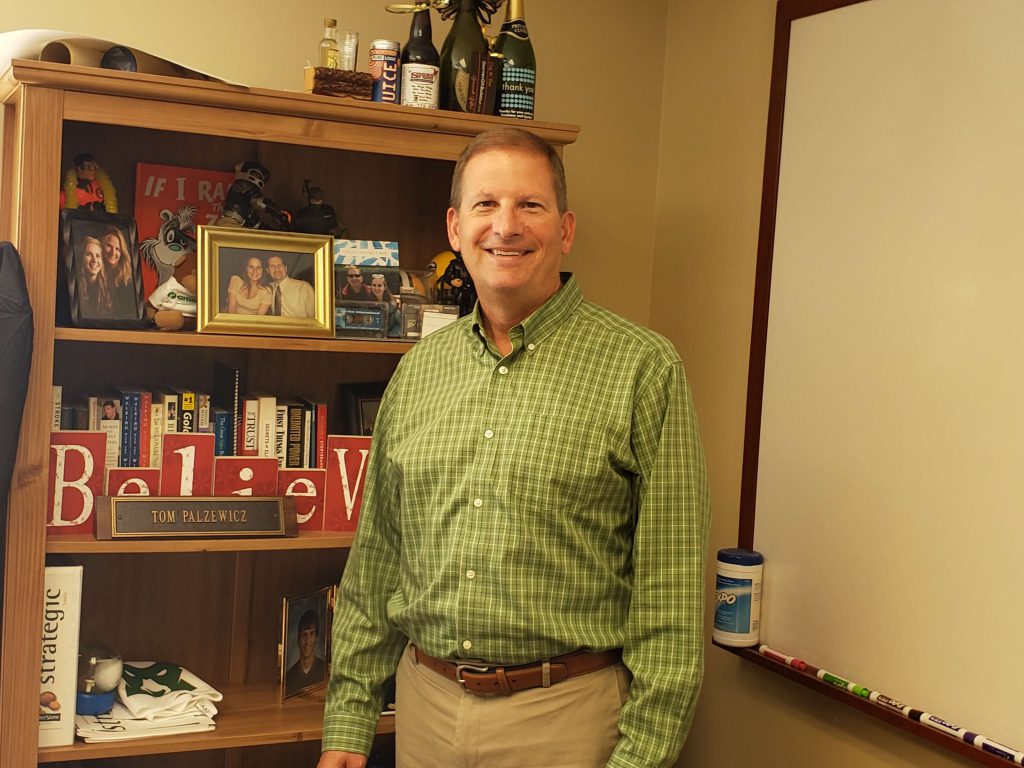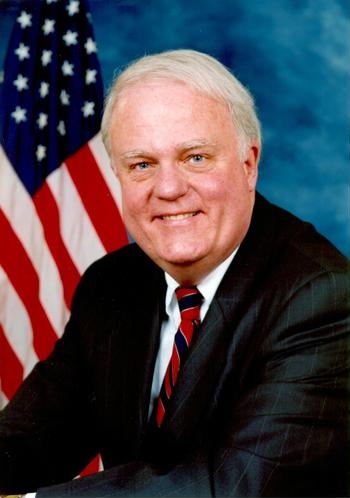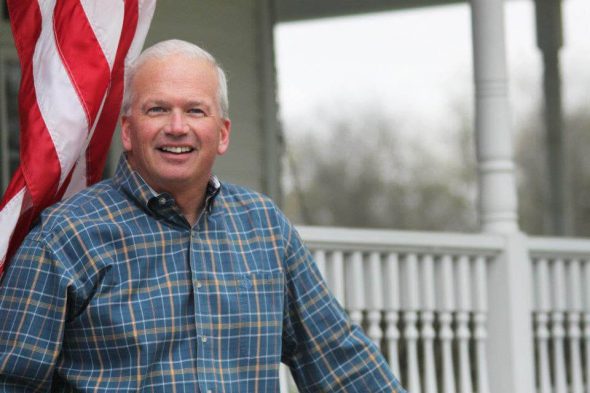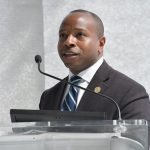Can Democrat Tom Palzewicz Win the 5th Congressional District?
He lost to Sensenbrenner with 38% of the vote in 2018, better than previous Dems had done

Tom Palzewicz of Brookfield is seeking the Democratic nomination to run for Congress in Wisconsin’s 5th District. Photo by Erik Gunn/Wisconsin Examiner.
Tom Palzewicz lost to Congressman Jim Sensenbrenner (R-Menomonee Falls) with 38% of the vote in 2018, but he has already had plans in the works for some time for a second run for Wisconsin’s 5th Congressional District.
The Brookfield Democrat figured he’d go public sometime over the next several months in his bid for a rematch against the 42-year House of Representatives veteran. Sensenbrenner’s decision to retire has sped up his timetable.
In an interview at his Elm Grove consulting office this week, Palzewicz expressed confidence that he could win despite long standing Republican dominance in the district, which covers Jefferson and Washington counties and parts of Dodge, Milwaukee, Walworth, and Waukesha counties.
“There’s no reason that a Democrat can’t get elected in the 5th Congressional District,” the 57-year-old banker-turned-executive coaching consultant says.
His first piece of evidence is his own 2018 race. In the two previous races, Democratic candidates “ran very credible campaigns” but garnered only 30%. While 38% is a long way from the 50% plus one it takes to win, “the thing I’m proudest of is we moved the needle,” Palzewicz says. And he did so on “a shoestring campaign” that spent about $250,000. This time around, he expects more resources to come in and arrive sooner in the cycle.
The current political dynamic in the state and the country also have persuaded him that the seat is winnable. Marquette Law School polling data show that the percentage of voters in the district who approve of President Donald Trump’s performance has fallen below 50% (although it’s still a net positive compared with those who disapprove).
Broadly popular issues
Palzewicz is running on issues he believes appeal to a broad swath of voters—including Republicans, some of whom he knows he’ll have to persuade to win the GOP-majority district.
“One is gun violence prevention,” he says. “It’s one of those issues that there’s a high percentage of people who want something done. And nothing’s happening across the nation, and nothing’s happening statewide, because it’s being bottled up.”
Polling data shows a majority of Americans favor universal background checks for gun buyers. He also believes that there’s a case to make for broader limits including limits on types of guns people can own. “Those are the conversations that we need to start having to move forward.”
Health care is another issue. “More and more people are realizing that healthcare is becoming unaffordable,” he says—even in the largely affluent 5th District, where people may have coverage, whether through an employer or other means, yet they see their insurance deductibles rising.
“There’s a free clinic in Oconomowoc that is busy all the time, because there’s a whole bunch of people who just don’t have access to affordable health care,” he says. “And more and more people are making decisions about whether to do something about their health based on how much it’s going to cost.”
Another is climate change. “That to me is our number one priority,” Palzewicz says. “All those other issues are real important, but if we don’t start to do something about the climate, all those other issues aren’t going to matter.”
A friend who is a research engineer recently pointed out to him that scientists “have constant fights with each other,” he recalls. “So to get 97% of scientists agreeing on something is the most fundamentally difficult thing to do. Yet it’s true when it comes to the climate. It’s so frustrating to see us not doing what we need to do about it.”
He believes facing climate change squarely has an upside. “It creates good jobs. It creates high-paying jobs,” he says. “And if we just had more solar panel factories, if we just did more with wind turbines, if we just committed to alternative energy sources, it would be good for the economy. It would be good for the people of the 5th Congressional District.”
The district’s changing demographics, he believes, also help his cause. “Wauwatosa has definitely changed rapidly over the last 3 to 4 to 5 years,” he says. “If you look at Elm Grove, you look at Brookfield, there’s a lot more young families moving in who just want answers.”
First campaign
While he had long harbored an interest in someday entering politics, Palzewicz says it was Trump’s ascent, and his subsequent behavior in office, that sparked his 2018 run against Sensenbrenner.
“I teach a lot about leadership and management, and as I’m watching this person gather more and more followers, it was very apparent to me that this was the antithesis of the way I would think about leadership,” he says, adding that it is a style of leadership that appeared to be based solely on self-interest, not on what is best for all.
He admits to engaging in a lot of “Facebook arguing,” but he realized that wouldn’t accomplish anything. He saw Trump’s election as “a terrible mistake, and I really didn’t come to terms with it until he started being that bully on a regular basis,” he says. “It touched something in me because I grew up in a home where my dad was a bully.”
He pauses. “It was one of those things that I really learned from, but at some point I found a way to stand up to him. And it dawned on me that through my entire life I’d always been that person who stood up for other people—the marginalized kids in school or anybody else that was being picked on. All of that came full circle for me, and I said to myself, ‘If I don’t stand up to this bully, what does that make me?’”
He opted to take on Sensenbrenner in part because of how entrenched he was: “When I turned 18, Sensenbrenner was my congressman. And when I first started running, I was 55 and he was still my congressman, and I just thought that was fundamentally wrong.” But another reason was because of what he saw as the same faults he found in Trump.
At Sensenbrenner’s regular town hall meetings, “he would just bully people,” Palzewicz says. “He wasn’t good at listening. He wasn’t good at bringing information back. It just felt like he wasn’t interested in representing the citizens of the 5th District of Wisconsin.”
Business acquaintances who learned of his plans typically assumed he was running as a Republican in a primary against the incumbent. “I said, ‘No, no, I’m running as a Democrat,’” Palzewicz recalls. “They said, ‘What do you mean you’re a Democrat? You’re a veteran. You’re a business owner. You live in Waukesha.’”
Sailor, accountant, banker
Palzewicz is the son of an assembly line worker at A.O. Smith’s now-shuttered automobile frame plant on Milwaukee’s near north side. “When they left, that created this huge hole in the city that still exists today,” he says.
Growing up he wasn’t particularly engaged in politics. When he cast his first ballot in the 1980 presidential election at the age of 18, it was for Republican Ronald Reagan “because I felt like his message was something that we needed in the country at that time.”
It was a choice he now regrets. “The way it turned out was definitely not helpful for our country,” he says, and since then he’s consistently voted for Democrats, seeing them as more aligned with his bottom line values of fairness and equality.
He spent the next 15 years in the banking business, the last five of them as treasurer of the mortgage subsidiary of U.S. Bank. During that time, he saw the impending tumble of the mortgage business that helped trigger the 2008 Great Recession. He and his colleagues were cautious in their lending practices, making less money in the short term, he says, but also avoiding the kind of risky practices that brought down some much larger financial institutions.
“If you could show lots of earnings by taking lots of risk you were rewarded,” he recalls. “It was something we talked about a lot, but we just felt like we couldn’t do it.”
His business experience has persuaded him that regulation has an important role to play in protecting consumers and the industry. He favors an increase in the minimum wage, advocates for higher taxes on the wealthy, and supports bolstering the Affordable Care Act while working toward some form of universal health coverage such as Medicare for All.
‘Results, not feelings’
“I work with a lot of numbers, and I help people understand how to run things by results, not feelings,” he says. “And the results we get in this country just aren’t what we need them to be.
“We’re the largest economy in the world and about 20-25% of the world’s economy, and we still have people that don’t have health care insurance. We still have people that scramble for food. We still have people that can’t afford an education. And I’ve always felt if we want people to pull themselves up by their bootstraps, we actually have to give them bootstraps.”
As a Democrat, he adds, “that to me is the fundamental difference between at least what we’re trying to do and what the Republicans are trying to do.”
Palzewicz hasn’t endorsed any of the Democratic hopefuls for the presidential nomination, but he speaks well of U.S. Sen. Elizabeth Warren (D-Mass.), whose campaign has stressed getting tougher on the financial industry as well as on government corruption.
Warren “does a great job not relying on Wall Street to hold each other accountable, because when it comes to making lots of money, it’s hard to also have a good system of integrity,” he says. “There needs to be somebody from the outside.”
“That’s a concern today,” he adds, “because we’re already unraveling some of the policies that were put in place from the last Great Recession.”
Seeking a vision
In 2004, Palzewicz switched careers to become an executive coach, helping business owners, CEOs and others “overcome some personal challenges and figure out how to get focused and stay positive and get the things done they want to get done,” he explains. Using personality profiles, and other tools and techniques, his goal is to understand “what drives people, what motivates people,” and then help them use those traits to live and work more effectively.
It’s a discipline that he believes will serve him well in dealing with voters as well as colleagues in government, if he is elected. “When I get in front of people, I ask a lot more questions than give statements,” he says. “Because the goal is to get people to think on their own and to help them understand. I can sit here and talk to you about what the answers are, but we as a group need to think about what the answers are in order to make change happen.”
He also believes he can offer voters a positive vision. “Ever since we no longer have a strong enemy in the Soviet Union, we’ve been fighting with ourselves,” he says. “We need a purpose, we need a passion, we need a vision for where we want to go as a country, and without anything like that we’re subjected to these totally dysfunctional tweets on a daily basis that seem to whipsaw people’s emotions.”
In 2018, knowing “nothing about how to run a campaign,” Palzewicz says, he relished the experience of meeting impassioned activists throughout the district. “You hear all sorts of stories about how horrible it is to get into a campaign. Well it was wonderful.”
It has bolstered his name recognition and laid the groundwork for the 2020 run, unencumbered by an incumbent.
So far, one Republican—state Sen. Scott Fitzgerald (R-Juneau)—has announced plans to run for the seat, while Sen. Chris Kapenga (R-Delafield) is also reportedly considering a bid.
“I think the most exciting part about running this time is we don’t really have to talk about our opponent,” Palzewicz says. “We get to talk about what we want to do. Before we had to constantly talk about Sensenbrenner and how after 40 years it was really time for a change.
“Our goal is to get out in front and let people know who we are and then talk about the issues, because frankly, at the end of the day, people don’t like the divisiveness. They don’t like all the turmoil. They just want things to start happening.”
Reprinted with permission of Wisconsin Examiner.























